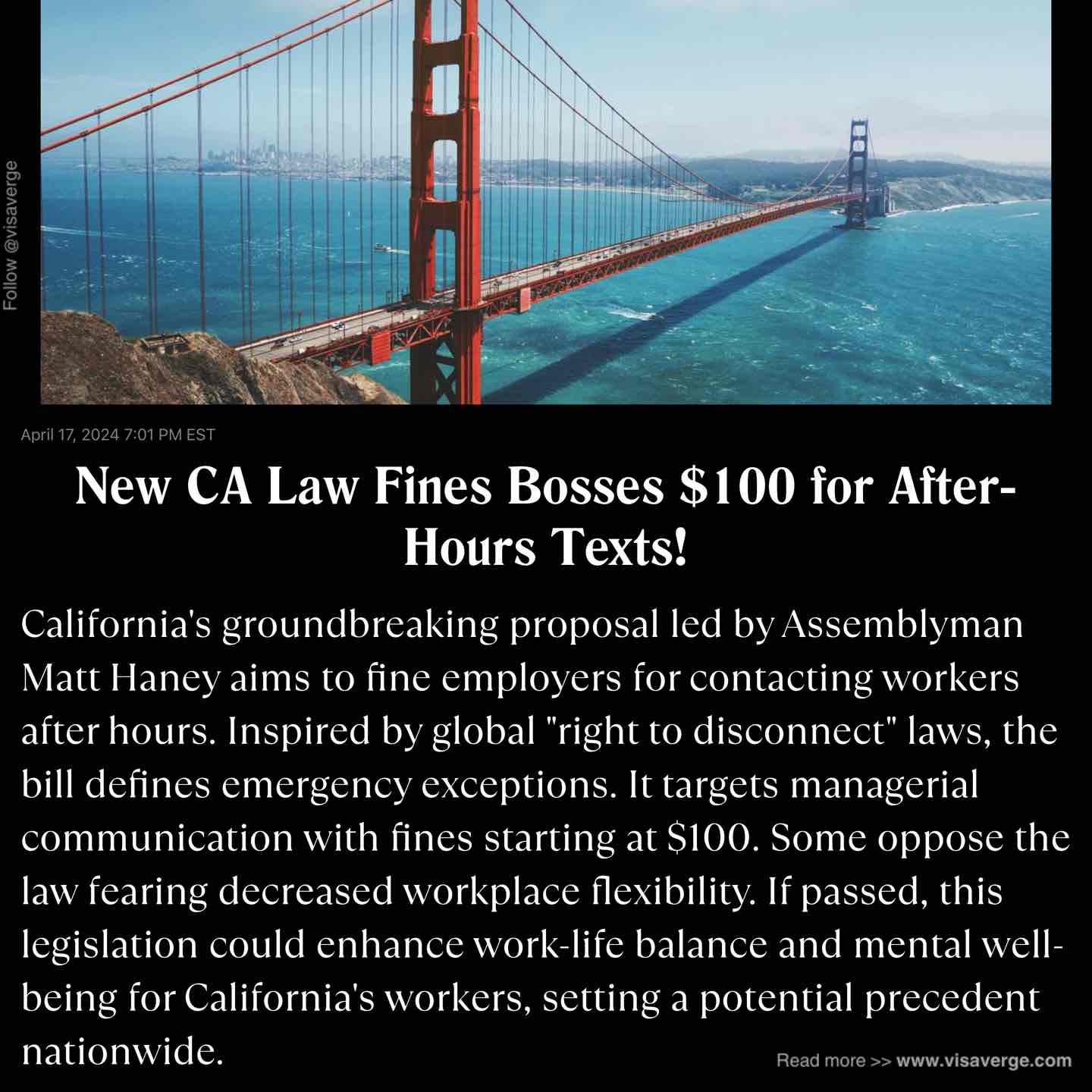Could Your Boss Be Fined For Messaging You After Hours?
California is paving the way with a groundbreaking proposal that might make your after-hours much more peaceful. San Francisco Assemblyman Matt Haney has introduced legislation that could fine employers for breaching workers’ time off. This move could make California the first state in the nation to grant employees the legal right to ignore work communications like calls and emails once their workday has concluded.

What Inspired the California Legislation?
Assemblyman Haney was influenced by similar laws in other parts of the world, including Australia, which recently passed a “right to disconnect” law expected to take effect later this year. France, Canada, and Portugal are among at least 10 nations that uphold such laws. Interestingly, New York City deliberated on a similar bill in 2018, but it was not adopted. Focused on enhancing workers’ rights and work-life balance, Haney mentions that “[t]he increasingly blurry lines of when people are on or off work have gotten worse.”
What Are the Specifics of the Proposal?
Under this new bill, if passed, employers would require a clear agreement with their staff stipulating official working hours. Employees would then rightfully ignore any communication outside these hours unless it’s a genuine emergency or relates to shift schedules within the next 24 hours. More precisely, emergencies are defined as unforeseen situations posing threats to employees, customers, or public safety, or leading to operational disruptions or even physical or environmental harm.
Employer violation of this regulation could lead to a fine of at least $100 for each instance, starting from the third offense. This measure is particularly designed to target managerial communications, meaning your peers messaging you late would not fall under this legislation.
Who Does This Law Apply To?
This proposed California legislation would be applicable to salaried workers within the state. However, it wouldn’t supersede existing collective bargaining agreements, thus unionized sectors such as teachers and nurses may continue adhering to their specific contract terms regarding communication after hours. Additionally, even remote employees working under California employers are covered under the proposed law.
What Are the Potential Challenges?
The proposal has not been warmly received by all, including the California Chamber of Commerce which argues that the bill might act as a “step backward for workplace flexibility.” Moreover, professionals like Joanna Starek, an organizational psychologist, express concerns about the practical implementation of such a bill, especially across organizations with diverse and geographically dispersed teams. Enforcing and monitoring compliance also poses significant hurdles, noted by employment attorney Tom Spiggle, who has pointed out that the administrative process for tackling complaints can be sluggish and inefficient.
Despite these challenges, supporters like Starek believe the legislation is a “step in the right direction” for fostering clearer job expectations and healthier work-life boundaries, thereby potentially boosting productivity and mental well-being.
How Would This Change Impact Workers?
Providing workers with the right to disconnect could help reduce job-related stress and anxiety, contributing to better overall mental health and job satisfaction. As Haney pointed out, achieving a better work-life balance for Californians is a primary goal of the bill, hopeful that it would “cut down on the stress and anxiety that inevitably comes with being available 24/7.”
For those curious about similar initiatives and legal standards, more information can be found at the California Department of Labor. Here, workers and employers can get detailed insights into state employment laws and workers’ rights, providing a comprehensive resource amid evolving workplace norms.
Conclusion
As the workplace continues to evolve, particularly with the permanent shifts brought on by remote work dynamics post-pandemic, such legislation could become increasingly relevant. While enforcement and compliance present considerable challenges, the proposed after-hours contact rule marks a crucial step towards acknowledging and protecting the personal time of workers in an always-on digital age. If successfully passed and implemented, this could set a precedent for other states to follow, substantially altering the landscape of worker rights across the United States.
Learn Today:
- Right to Disconnect:
- Definition: A legal concept that grants employees the right to ignore work-related communications, such as calls and emails, outside of their official working hours. This right aims to promote work-life balance and protect personal time.
- Salaried Workers:
- Definition: Employees who receive a fixed compensation on a regular basis, typically monthly. In the context of the proposed California legislation, it refers to individuals who are paid a salary rather than hourly wages.
- Collective Bargaining Agreements:
- Definition: Negotiated agreements between employers and labor unions that outline terms and conditions of employment for workers, including wages, working hours, benefits, and workplace rights. These agreements are legally binding and may supersede certain statutory regulations.
- Remote Employees:
- Definition: Workers who perform their job duties outside of a traditional office setting, often from home or another location away from the employer’s premises. In the context of the proposed law, remote employees working for California-based employers would be covered under the legislation.
- Workplace Flexibility:
- Definition: The ability for employees and employers to mutually agree on arrangements that allow for variations in work hours, work locations, and work patterns. This concept encompasses practices such as telecommuting, flexible scheduling, and remote work options to accommodate individual needs and enhance job satisfaction.
This Article In A Nutshell:
California proposes a pioneering law to fine employers for contacting workers after hours. Inspired by global models, this bill aims to grant staff the right to disconnect, safeguarding work-life balance. Challenges like enforcement and opposition exist. If successful, it could enhance mental well-being and redefine workplace standards in the US.
— By VisaVerge.com
Read more:
- US Visa Rules Tightening for Chinese Nationals Amid Security Concerns
Explore the latest updates on visa regulations affecting Chinese citizens due to heightened legislative security measures. -
Tata Consultancy Services Faces Lawsuit Over Alleged H-1B Visa Worker Preference
Read about the ongoing legal battle involving one of the largest IT service companies and its hiring practices in the US. -
Changing Lawyers During Your H-1B Application Process: What You Need to Know
Get informed on the implications and steps involved in switching legal representation while navigating your H-1B visa application.














